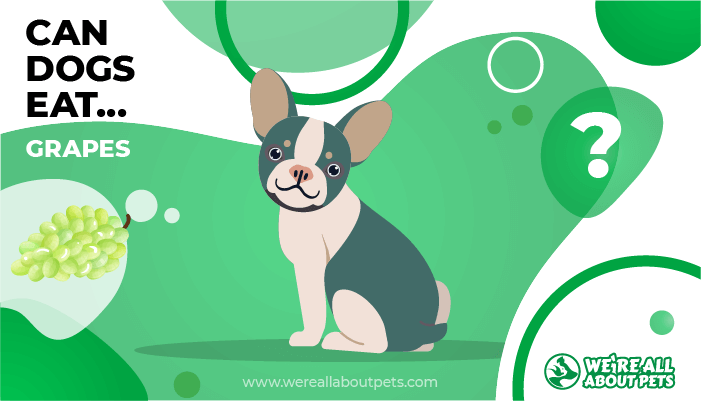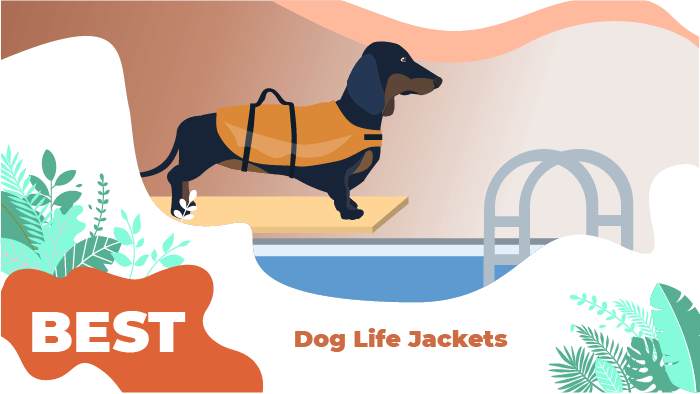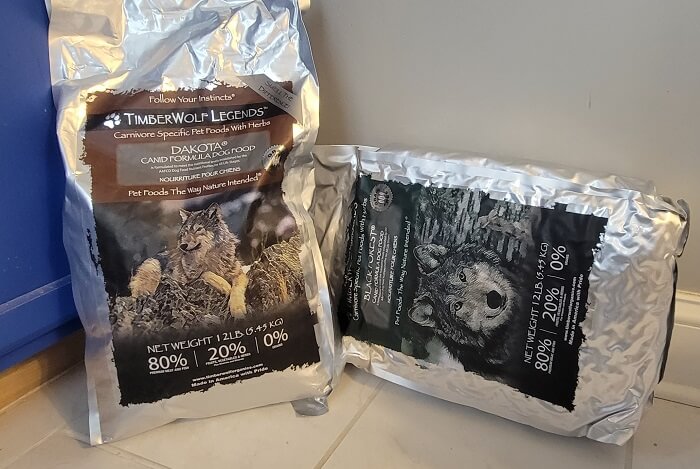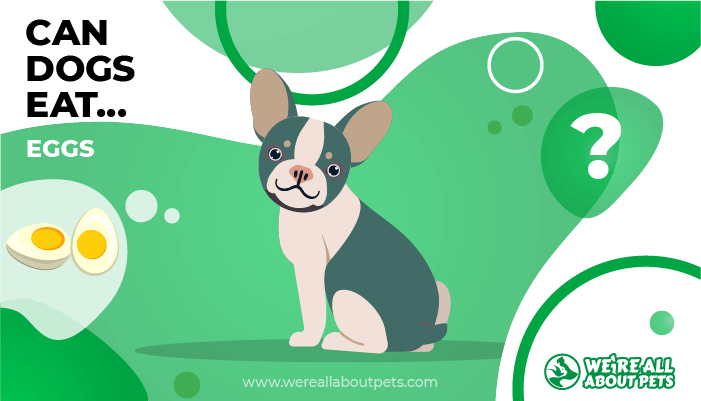Can Dogs Eat Grapes?
This page contains affiliate links. We may earn money or products from the companies mentioned in this post through our independently chosen links, which earn us a commission. Learn More
We can share many of our favorite foods with our canine friends. Unfortunately, for the question, “Can dogs eat grapes,” the answer is a resounding “No.” The same is true for raisins, which are dried grapes.
The exact reasons why grapes are toxic to dogs haven’t been confirmed but giving your dog grapes or raisins can lead to renal failure and related problems in some dogs.
You can find more information about dogs and grapes in our short guide below.
Grapes Nutritional Facts At A Glance
One cup (151 grams) of grapes is considered to be a serving.
Grapes provide a good source of vitamins C and K. However, a large portion of their calories come from sugars.
Grapes are made up of 94 percent carbohydates, 2 percent fats, and 4 percent protein.
Can Dogs Eat Grapes?

No, dogs should not eat grapes or raisins. The exact reason why grapes and raisins are toxic to dogs is not certain but it’s thought that mycotoxins are involved. Mycotoxins are a naturally occurring toxic agent produced by certain molds and fungi that can be found in foods.
The mold can grow in a variety of crops and foodstuffs such as cereals, nuts, spices, dried fruits, apples, and coffee beans if conditions are warm and humid. There are many different kinds of mycotoxins. Mycotoxins that would be toxic to dogs haven’t been identified yet but they have been suspected of being present for years.
Other experts believe that an aspirin-like drug might be naturally found in the grape which could decrease blood flow to the kidneys. However, this kind of chemical has not been found so far.
Raisins are thought to be even more toxic to dogs than grapes because they are a concentrated form of the grapes.
All different kinds of grapes are considered toxic to dogs : seedless grapes, seeded; red grapes and green; commercial and home-grown; organic and non-organic; and even pressings from wineries.
Foods that contain grapes, raisins, and currants such as jellies, jams, and other products can also be toxic to your dog. Many of these foods also contain large amounts of sugar which is not good for your dog.
How Many Grapes Are Dangerous For A Dog?
When it comes to grape poisoning and raisin toxicity, there are no hard and fast rules.
Some dogs appear to be very sensitive to grapes and raisins while others don’t seem to notice these products of the vineyard.
Not every dog that eats grapes or raisins get sick. According to one study, in some cases the harmful amount of grapes can be relatively small. Just 10-15 grapes caused problems in some small dogs.
According to the information we found, the lowest recorded amounts that led to kidney failure in dogs were for grapes: 0.3 ounces of grapes per pound of body weight; and, for raisins, 0.05 ounces per pound. This would mean that a 50-lb dog could be poisoned by eating just 15 ounces of grapes; or 2-3 ounces of raisins.
So, your dog probably won’t be affected by eating a single grape or one raisin. But there is little margin for error and you should not give your dog grapes or raisins. Dangerous doses could begin at just 1–2 grapes for a 10-pound dog, or 3–4 grapes for a 20-pound dog.
Since the cause of grape toxicity is not well-understood, it’s best not to give your dog any grapes at all.
Which Dogs Are At Risk From Grape Toxicity?
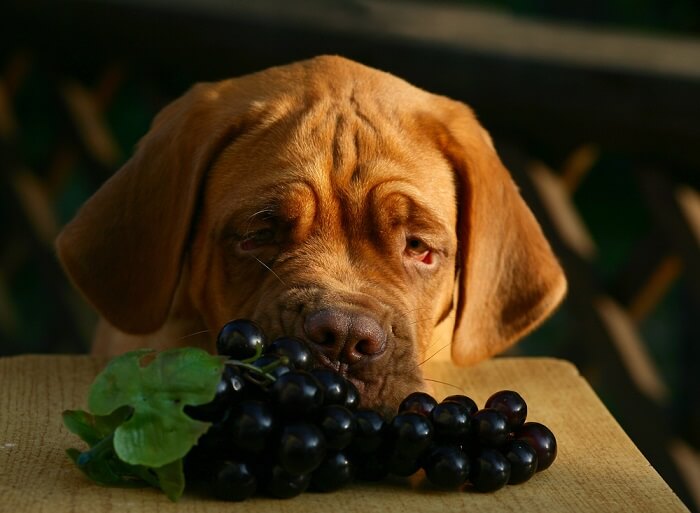
At this time there don’t seem to be any indications that certain dogs are more at risk than others. Males, females, big dogs, little dogs, purebreds, mixed breeds, old dogs and young dogs – all of them can experience grape poisoning.
Grape and raisin toxicity can be fatal. It is also common. According to the ASPCA Animal Poison Control Center, they received a total of 3722 calls involving grapes and raisins in 2016.
Symptoms Of Grape Poisoning Or Grape Toxicity
If you think that your dog ate grapes or raisins, contact your veterinarian or a pet poison hotline immediately. The sooner you act to have the poisoning diagnosed and treated, the better the outcome can be for your dog.
Symptoms of grape toxicity to look for include:
- Vomiting, usually seen within 24 hours of ingestion
- Loss of appetite
- Lethargy
- Diarrhea, can be seen within the next 12-24 hours after ingestion
- Dehydration
- Acute kidney failure, 24-48 hours after ingestion
- Nausea
- Uremic breath
- Abdominal pain
- Excessive thirst
- Excessive urination
If your dog goes into acute kidney failure and symptoms continue to worsen, the kidneys may shut down and your dog won’t produce any urine. The prognosis is very poor after this point.
How Is Grape Poisoning Diagnosed And Treated?
Grape and raisin toxicity are hard to diagnose because the symptoms are similar to many other kinds of poisoning and not very specific. Unless you see your dog eating grapes or raisins, it can be hard for your veterinarian to know the cause of the toxicity.
Your vet will need to look for grape or raisin pieces in your dog’s vomit and stool. Diagnostic tests, such as blood work for a complete blood count (CBC) and urinalysis to asses kidney damage, can help determine your dog’s prognosis.
There is no specific antidote for grape or raisin poisoning. Your veterinarian will be trying to prevent your dog from going into acute renal failure.
Treatment will aim to block absorption of the toxins and minimize damage to the kidneys. The sooner you contact your veterinarian if you suspect your dog has eaten grapes or reasons, the sooner assessment and possible treatment can begin.
For dogs who only eat a few grapes or raisins and receive immediate treatment, the prognosis is very good.
Are Grapes Good For Dogs?
Nutrients in grapes are irrelevant. It really doesn’t matter if grapes are “good” or not. You should not give them or foods that contain them to your dog.
How Many Grapes Can Dogs Eat?
Dogs should not be given any grapes, raisins, or currants. These foods put your dog at risk of consuming toxins that can endanger is life.
The Correct Diet Is Important
Dogs need to eat the correct diet for good health. This means that they require good quality protein and fat.
Grapes are not part of a dog’s diet, even in small amounts. While there are many different ideas about good dog foods and different ways to feed dogs.
Your dog needs the following in his diet:
- Good Sources of Protein- All dogs need good sources of animal protein in their diet. Meat, fish, poultry, and eggs are all good sources of animal protein.
- Good Sources of Fat- Fat provides essential fatty acids (EFA) and helps distribute the fat soluble vitamins A, D, E, and K so your dog’s body can absorb them.
- Named Ingredients- Look for named ingredients in your dog’s food and avoid generic ingredients. The more specific the ingredient is, the better. Otherwise, you don’t really know what you are feeding your dog.
- Low to Moderate Carbohydrates- Many dog foods are loaded with carbohydrates. This is true even with some good quality foods. Carbohydrates are not “bad” and they can be beneficial (dietary fiber can come from carbs, for example). But carbs should not be a substitute for protein.
- Avoid Artificial Preservatives, Colors, and Sweeteners- Artificial preservatives and colors/dyes have been linked to some health problems in humans and animals. You should try to avoid these ingredients in dog foods.
- AAFCO- AAFCO is the Association of American Feed Control Officials. AAFCO sets voluntary standards for pet food labeling. Look for foods that have these minimum standards.
- Fresh Water- All dogs need easy access to fresh water unless they are ill or have some other reason to be temporarily kept away from water. For example, if you are house training your puppy, it makes no sense to give him water overnight.
What Are Healthy Alternatives To Grapes In A Dog’s Diet?
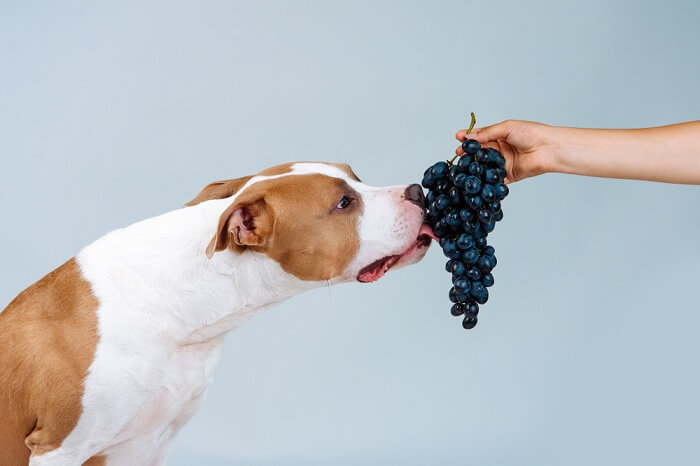
There are many fruits and veggies that are safe for your dog to eat. You should consider these human foods as treats.
Check with your veterinarian if your dog has any health issues and you are concerned about giving any of these foods.
- Apples
- Asparagus
- Avocados
- Bananas
- Bell pepper
- Broccoli
- Brussels sprouts
- Carrots
- Cauliflower
- Cucumber
- Green beans
- Mangos
- Parsnip
- Pears
- Pineapple
- Pumpkin
- Strawberries
- Summer squash
- Sweet potato
- Tomatoes
- Watermelon
- Zucchini
Conclusion
While humans enjoy grapes, raisin, wine, and other products made from these foods, they can be very dangerous for your dog. The reasons for grape toxicity are not entirely understood at the moment but don’t risk your dog. Don’t let your dog have any grapes or raisins.






